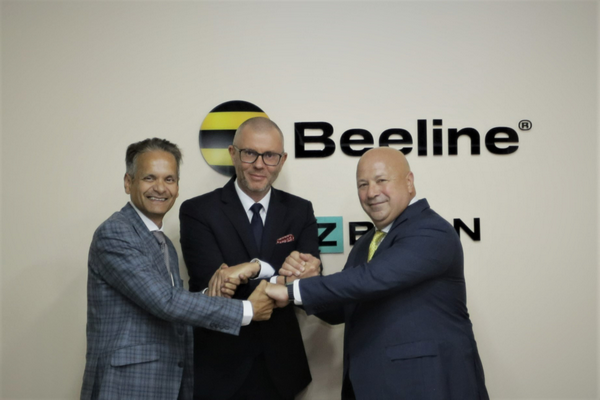Tashkent, Uzbekistan (UzDaily.com) -- On September 12, Beeline Uzbekistan, one of the largest foreign investors and taxpayers in Uzbekistan and a subsidiary of the NASDAQ-listed global digital operator that provides converged connectivity and online services VEON Group, celebrated its 17th anniversary. The CEO of VEON Group Kaan Terzioğlu, visited Tashkent in honor of this event.
Mr. Terzioğlu spoke exclusively to UzDaily about the operator's current work, the company's future objectives, the necessity of education, and AI augmentation.
Uzbekistan has been experiencing significant growth in its telecommunications sector in recent years. Can you provide an overview of your company's current operations in the country, including the scale of your network infrastructure investments? What are your plans for the near future?

First of all, this is our 17th year in Uzbekistan. Over the past 17 years, we have invested more than 1.4 billion dollars and have become one of the biggest tax payers in the mobile industry in this country. I am so proud that we have made this choice because Uzbekistan has proven to be one of the fastest-growing markets in Central Asia and a leader in IT services.
Secondly, as you know, as soon as we get the chance we will be moving to the IT Park in our new building. I am extremely excited about the opening of our new office. We have already established our advertising technology company in Uzbekistan, VEON AdTech, and Beeline is now a digital operator.
We have completed the first round of investments. Of course, our investments will continue, taking into account the country’s investment climate.
The COVID-19 pandemic accelerated the need for digital transformation and increased reliance on telecommunications services worldwide. How is your company contributing to Uzbekistan’s digitalization efforts, and what initiatives are in place to ensure that even remote and underserved areas of the country have access to reliable and high-speed internet connectivity?
The COVID-19 pandemic really proved that infrastructure, especially mobile infrastructure, is not a luxury but an essential means of living. The lives of individuals and companies, whether in cities or rural areas, heavily depend on their ability to access mobile internet. That’s why we are focusing on bringing 4G to all, not 5G to a few. As an outcome, there are 6.1 million 4G customers at Beeline Uzbekistan as of August 2023, which is a 20% increase since last year. Data shows that Beeline Uzbekistan’s customer base has grown by 8% this year compared to last year, totaling 8.6 million clients. 7.6 million users, which is a rise of 14%, are currently using data traffic. There has been a 214 PB, or 61%, increase in traffic over the first eight months of this year compared to 2022, totaling 529 PB.
Our goal for 2023 is to achieve 85% 4G coverage in Uzbekistan. We want high-speed mobile Internet and reliable connectivity to be available even in Uzbekistan's remote and sparsely populated regions to make sure people have meaningful access to education, health care services, mobile financial services, and e-government. During the first phase of the network upgrades, 70% of Beeline Uzbekistan's high-capacity base stations built this year supported the LTE communication standard. The second phase will be finished by the end of October, resulting in 1,500+ launches and the modernization of more than 100 radio relay lines.

Telecom companies often navigate complex regulatory environments in different countries. What are some of the regulatory challenges your company faces in Uzbekistan, and how do you plan to collaborate with local authorities to overcome these challenges?
Uzbekistan is undergoing a period of rapid growth. In fact, while the entire world slept during the COVID pandemic, Uzbekistan kept on working, just like in fast-growth periods of a human’s life. There are pains of growth anyway. And I see that the government is taking very proactive measures to make sure that all players in the market are treated equally and that private investment is respected – fair treatment of privately-held foreign companies like ours – is crucial for our investment decisions and we will be watching this closely. That’s why we trust in the government, and we are looking forward to collaborating with them to make Uzbekistan an example of a digitalized country in accordance with the "Digital Uzbekistan-2030" strategy.
As the telecom industry evolves rapidly, what strategic steps is your company taking to stay competitive and innovative in the Uzbek market?
Every single person in Uzbekistan needs to have the ability to be included in the financial markets and access to educational resources: schools, universities, online learning, and online health care services. That’s what a digital operator really does. Beeline in Uzbekistan aims to be a leading digital operator, not only serving customers with SMS, minutes of talk, or megabytes of Internet data but also providing them with digital services that touch their lives, whether they are individuals or companies. Whether they live in a city or a rural area should not make a difference.
You will see us investing heavily in 4G for all bringing mobile connectivity everywhere in Uzbekistan. We will go beyond the traditional telecom company as part of our DO1440 strategy which allows us to cater to all the needs of our users. Beeline Uzbekistan currently has 11 digital entertainment, fintech and educational products. The number of users of the Beeline Uzbekistan app already exceeds 3 million.
You will also see us active in entertainment and education, healthcare, and mobile financial services. One such example is the fintech app Beepul, which already has more than 600 partners for payments. These are the things that, in our opinion, are crucial to both the competitiveness of businesses and people's quality of life. And we will be there to partner with them to make sure that not only Uzbekistan grows, but Uzbek entrepreneurs grow, and people in Uzbekistan have a better quality of life.
VEON is actively investing in education in Uzbekistan, with a focus on the IT sector. What goals does the group want to accomplish with this?
It’s critical that we not only educate people who are students but also provide education to everybody at every age. This is one of the major success criteria for a developing nation.
When I look at, for example, what we have achieved in Kazakhstan, a neighboring country where every single teacher, not necessarily a student, has access to AI-based course planning and teaching plans, I believe these are the tools that we have to bring to Uzbekistan too. All the curriculum needs to be digitized, and we should not only limit ourselves to primary and high school children; we also have to focus on people who are now unemployed in order to help them develop new skills and competencies.
And thanks to technology today, anyone with a smartphone in their hand has access to the best schools in the entire world. That is why we have to not only build physical schools, but we also have to build the infrastructure for people to access education sources anywhere in the world.
Should we take into account the potential risks that implementing AI may bring, if you believe there are any?
We should not be afraid of AI. We are the ones who are going to use artificial intelligence, which is why I call it augmented intelligence. How can decision-making abilities be augmented in people? For instance, the integration of AI into Beeline Uzbekistan’s customer care will raise the quality of all client communication methods, including voice, online chat, and messengers. Modern robotics solutions make it possible to respond to a significant number of customer inquiries without involving contact center staff, which will improve the contact center's accessibility to all clientele.
Additionally, the effectiveness of advertising campaigns rises as a result of the application of both artificial intelligence and big data, as demonstrated by our company, VEON AdTech.
Nobody will be replaced by AI. But people will be replaced by other people who use AI effectively. That is why we should embrace it and take the initiative to make Uzbek a native language of artificial intelligence in the future.